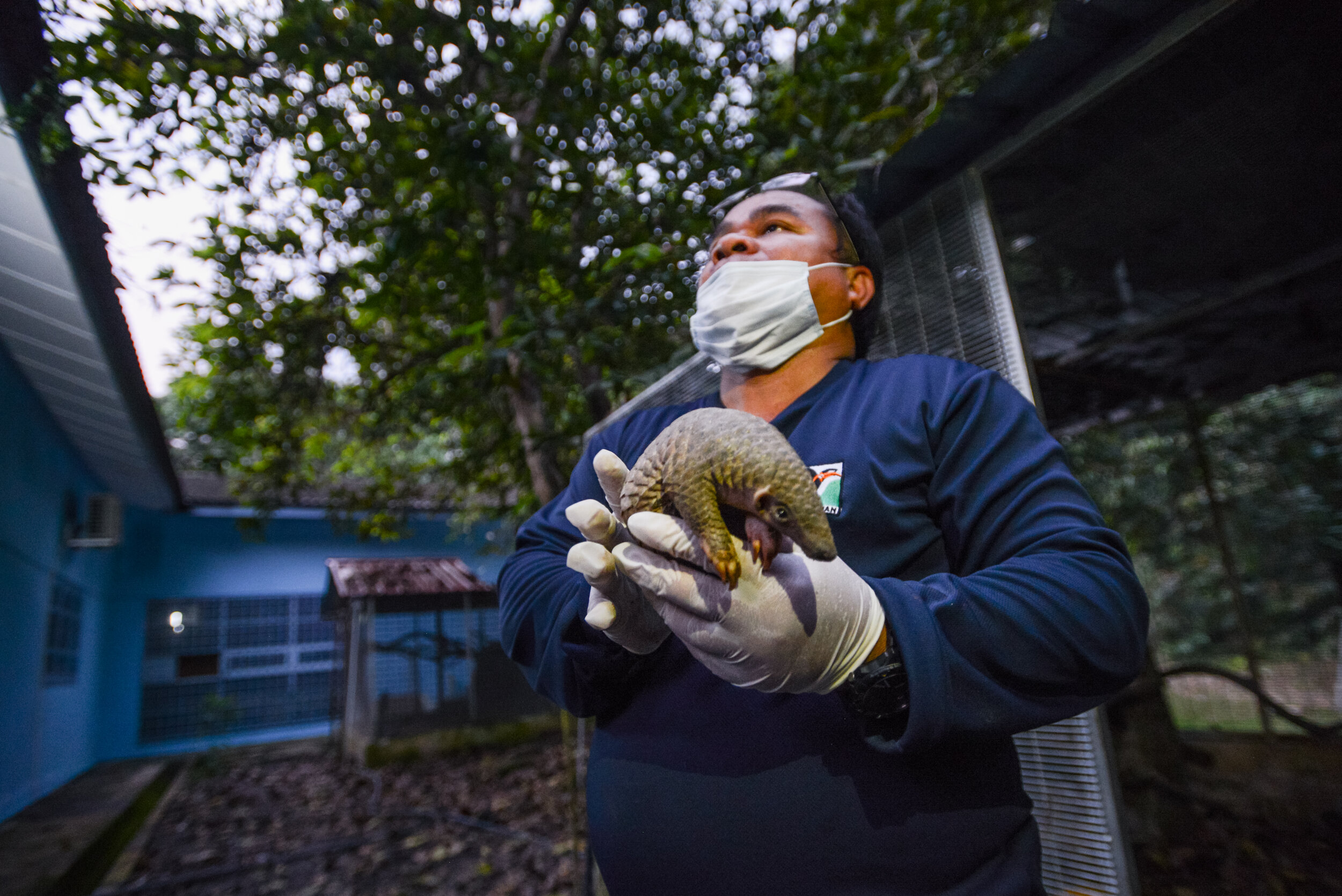Malaysia’s first captive-born pangolin meets the public
Cosmas Ngau, head of the Malaysian wildlife department’s breeding programme cradles Corona, the first captive-born pangolin in Malaysia.
Photo by: Puah Sze Ning
By: Claire Anthony
Malaysia celebrates the birth of its first captive-born pangolin with a “Zoom party”
Wildlife law enforcement operations in Malaysia have continued throughout the Covid-19 crisis
Over 200 pangolins screened for viruses in Malaysia since 2011, none found to carry coronavirus
Experts and authorities urge the public to help protect wildlife by actively reporting wildlife crimes
The illegal trade of its scales and meat has made the pangolin the world’s most trafficked mammal, but in a huge leap for Malaysian researchers, a Wildlife Department (Perhilitan) breeding program has resulted in the first baby pangolin to be born in captivity here.
Over 200 people turned out for a “Zoom party” (using the popular video conferencing app) to celebrate the baby pangolin’s birth, including wildlife experts, journalists and members of the public. They gathered to see an exclusive live video feed of the month-old baby, named “Corona”, and to discuss how to protect the critically endangered animals.
The session included a live video-link to Corona’s home at Perhilitan’s Sungkai Conservation Centre, where the head of the breeding program, Cosmas Ngau, answered questions about her care to an international audience.
Screenshot of the “Zoom party” to celebrate Malaysia’s first captive-born pangolin, attended by over 200 participants.
Despite the many challenges of raising pangolins in captivity, Cosmas and his team have worked hard to ensure Corona and her mother Tara stay healthy, including creating a series of ant farms to ensure there is a sufficient supply of the insects for the pair to eat.
Cosmas told excited viewers that he felt like “a proud grandfather” when Corona was born, after being so invested in the process, from mating to pregnancy scans and now raising the baby pangolin herself. Researchers and conservationists hope to gain new insights into the lives of pangolins by observing this special moment for Corona and her mother Tara.
Joining the conversation were Perhilitan Director-General Datuk Abdul Kadir Abu Hashim and Principal Research Officer Dr Jeffrine Ryan, pangolin researcher and Universiti Malaysia Terengganu lecturer Dr Chong Ju Lian, and Traffic senior communications officer Elizabeth John.
Watch the full discussion:
"Elizabeth shared statistics that show over a 20-year period, 895,000 pangolins were seized around the world, causing three out of the four Asian pangolin species to become critically endangered – one step away from extinction.
“We are removing them from the wild at a rate that they can’t be replaced,” she said. “If demand continues like this, there simply won’t be any pangolins left.”
She also highlighted that it’s often tip-offs from the public that make it possible for authorities to make seizures of illegal animals or animal products.
Corona, Malaysia’s first captive born pangolin, clinging to the tail of her mother, Tara.
Photos by: Puah Sze Ning
"Our latest enforcement operation began in September 2019, alongside the Royal Malaysian Police and we haven't stopped since then. Even during the movement control order, our operation continued," said Datuk Kadir about his departments' efforts to protect local wildlife such as pangolins.
In Malaysia, a movement control order was imposed on March 18 to slow the spread of Covid-19, and has since been only partially lifted.
Since the Covid-19 outbreak, zoonotic diseases – those that originate from animals – have been firmly in the spotlight. Samples from pangolins seized by Chinese authorities have been analysed by researchers, and found to contain strains of coronavirus similar to Covid-19. This has led to concerns that pangolins could be a carrier of the virus.
However, research conducted by Dr Jeffrine and his team at Perhilitan, in collaboration with EcoHealth Alliance, has shown that none of the over 200 pangolins seized and studied in Malaysia since 2011 were found to have any of these coronavirus strains. The team’s findings were submitted on June 1 to a journal for publication, and are currently undergoing peer review.
However, he added that pangolins are still potential carriers of zoonotic diseases, and the pangolins found with coronavirus in China likely picked up the virus while they were in the illegal trade.
“Everyone – governments, businesses, individuals – needs to think about how our contact with wildlife is creating opportunities for diseases to spread and then prevent these opportunities as much as possible,” said Elizabeth.
The Zoom party was the first of a four-part interactive wildlife series presented by the Environmental Reporting Collective. To join upcoming sessions, click the register button below:
18 June: Can pangolin farming curb its illegal trade? Register
25 June: Indigenous peoples and wildlife conservation in Malaysia Register
2 July: Traditional Chinese Medicine and the demand for endangered wildlife Register




